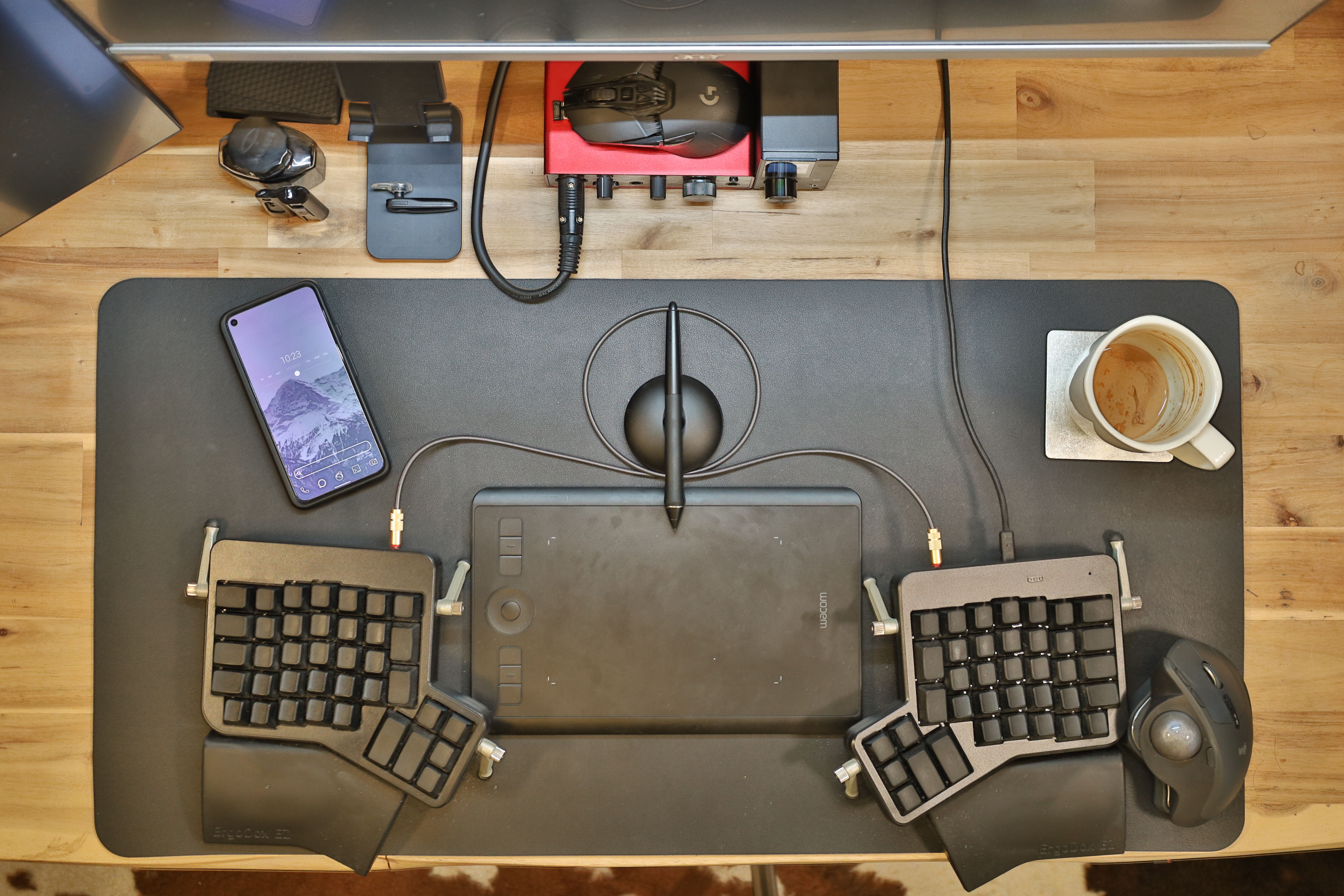This is a decade old laptop.
It has no storage, it runs 4gb of ram, and I love it. I use it everyday. I intentionally have switched the wifi off on it. It only has my config files to get my desktop up and running, and Emacs on it. Memes aside, I believe in deep focus, and to obtain that, you must put all things to the side that don’t push you forward in the task you wish to accomplish. I use this computer strictly to write the scripts to the videos you watch, and the articles that you read on my website.
There’s a huge community surrounding typewriters, believe it or not - even to this day. Why? One reason: Focus. Some of the most prolific authors still use exclusively pen and paper to create. And while we can get into the nuance of writing the same thing multiple times and the frustration that must inevitably come with it, there’s an argument for the use of a purpose built device or system to get your work done.
We live in a world of constant distraction. You could be doing anything else right now, and that’s the biggest challenge most of us face in achieving whatever it is that we have set out to achieve.
As “multitasking” becomes more of a buzzword, I want you to unmultitask.
If you want focus, you need to contextually immerse yourself in whatever task that you may be trying to accomplish. In this article, I’m going to lay out how I personally have created a system that allows this focus - the Purpose Built Method.
As gps devices, notebooks, timers, alarms, and even desktops are being replaced by the smartphone, I want you to go the opposite direction.
Let’s talk about why.
Multitasking is a Lie #
So many of us pride ourselves in our ability to “multitask”, however what we really do is just switch tasks and contexts. We get into the flow of things, and then all of a sudden, we switch out of this state, to work on something else, and we never really get anything done.
It became obvious to me that I need to compartmentalize what I am doing. If I can point my focus on a task, finish that task, and move onto the next, then I am undefeatable. But, most days, I simply was going from one thing, to another, to another, simply drawn by the whims of the notifications, dings, and various distractions that would come my way.
In reading Deep Work by Cal Newport, you come to this realization. Any world changing idea, or book, or piece of art, or program, was created by someone that was able to UN-Muiltitask, remove distractions, and to focus on one highly impactful piece of work.

I began to carry this thought across all my technology and use cases. I no longer believe in multitasking.
Temptation Abounds #
The issue with writing on a laptop is the internet access and temptation that comes with the world at your fingertips. You could be doing anything else than writing, and most people do. Their focus is all over the place, they are not productive.
I saw it in myself when I wanted to sit down and write. Or record and edit a video. Or write code.
There I was, wanting to do my work, but there were the disctractions coming in on a minute’s basis. And while we can brute force ourselves into avoiding these temptations, inevitably something will take our focus away, and we will be doing less than we could be.
The average 8 hour employee does something like less than an hour of actual work per day - what would you do with an additional 7 hours of focused and purposeful work?
Discipline and Willpower #
It requires deep discipline to avoid temptation. And, this is fleeting.
So, why not just create a system that destroys temptation altogether? Why not take the willpower out of the equation and help ourselves by creating usecases and intention?
We can create context, and then enforce it through our choice of what devices we are using.
You don’t need your phone to write or to do your math homework.
You don’t need your gaming computer to write code (we’ll discuss this).
You shouldn’t be using your phone to read books, or to surf the web, or to watch videos.
You take discipline out of the equation with the Purpose Built Method.
Your Devices and Usecases: #
All of this lead me to break up my needs of my devices, select the best one for the job, and leave the other ones at home when I did not need them. What follows is how you too can do this, without much cost. The irony is that to achieve digital minimalism, you have to have a couple more devices. But, those devices to their job better than any general use device could.
Phone #
A phone should be a phone. Not a consumption device. Unfortuantely, the advent of the general use computer (and the dropping of this computer into every person’s pocket) has created a generation of distraction.
Social media, videos, podcasts, constant notifications, and 24/7 connectivity come at the price of being able to disconnect and focus. Read Deep Work or Digital Minimalism by Cal Newport to explore this phenomenon further.
It was as such that I began to break up the tasks that my phone used to handle. That is not to say I won’t take notes or browse (with purpose) on my phone if I have no other option, but there are better devices suited for these tasks.
I don’t put email on my phone, I have one email that people can reach me at on the phone, and otherwise, my emails are all read on my work machines.
If I have to make a post on social media, I download the app, post, and delete the app again. If you want to get a hold of me, I will reply to messages only when I check them, once a day or less (I give my phone number out to these people so they can directly reach me).
If you want to contact me, I have switched off all notifications. I answer calls, because it’s part of my job, but I respond to text messages and IMs perhaps once every hour or less.
I don’t have apps on my phone, other than security, privacy, and utility apps for use in a pinch. Some people go so far as to completely ditch the smartphone and use a ’feature phone’ as these companies call Dumb Phones. I need the gps utility of the smartphone, as well as some other work applications, otherwise I would probably be right with these dumb phone crusaders.
I have made my phone a tool again, instead of being a crutch.
The smartphone is the number one culprit in distracting us from our work and goals. Get it to work for you, instead of you working for it.
Reading #
When I want to read, I pull out my Kobo e-reader or a good old fashioned book. I don’t read on my computer or phone as many people do with their kindle apps. I don’t want distraction. I want focus.
The fact is that people can’t read nowadays because they are distracted by what is happening around them. They can’t get into the groove of sitting and immersing themselves, letting their imagination take over.
How do you gain this ability back? We all had it as children, didn’t we?
Answer: You take away distractions.
Work #

I have a desktop for work. I make videos, write code, and run my various businesses from this desktop. I have a laptop for this when I need to be mobile. I don’t game on this computer. I don’t mindlessly scroll. I don’t consume. I produce.
If you want to game, then I think you should either get a dedicated device for this (console) or you should multi-boot your computer with Windows and Linux like I used to. That way, all temptation of gaming is gone, and you will be immersed in the experience of working when you work, and enjoyment when you enjoy.
Content Consumption #
If I want to Consooooom content, I have a cheap Android tablet that allows me to watch videos and read forums/imageboards. This tablet remains in a drawer when I am not using it, I take it out at lunch time to get in a couple youtube videos, or after a day of work to visit my favourite forums. This allows me focus on things that I want to accomplish, not on consumption.
The smartphone that we carry around is a lousy consumption device, it has a tiny screen, the input of your two thumbs is inferior to using a keyboard, the audio isn’t good, etc. Use it to make calls and communicate, and then have a cheap device to consume only when you intentionally want to consume.
Conclusion #
Yes, I understand that this leads to more devices in your life, and is against the “minimalism meme” this is so heavily pushed today.
I’m personally not a minimalist - I’m a maximalist.
Even so, the devices all fit within a backpack just as any single laptop or device would.
They also cost less: The cost of these devices (dedicated writing laptop (<$150), dumbphone ($50-150) OR dumb-smartphone ($400), kobo ($120), cheap tablet ($200), work laptop ($500)) adds up to far less than a flagship smartphone and laptop. So, who is actually “minimalistic”?
I argue that the value you produce will far outweigh the cost of these devices. With the added hours of focus I have given myself, I am producing more, have less stress (from constant connectivity), and am enjoying the things I originally had set out to enjoy.
Contextually, you use these devices for the purpose that you desire them to accomplish, and not for the things that you don’t intentionally want.
Intention is everything. And by making your use case intentional, you will be happier and more successful. I guarantee it.

